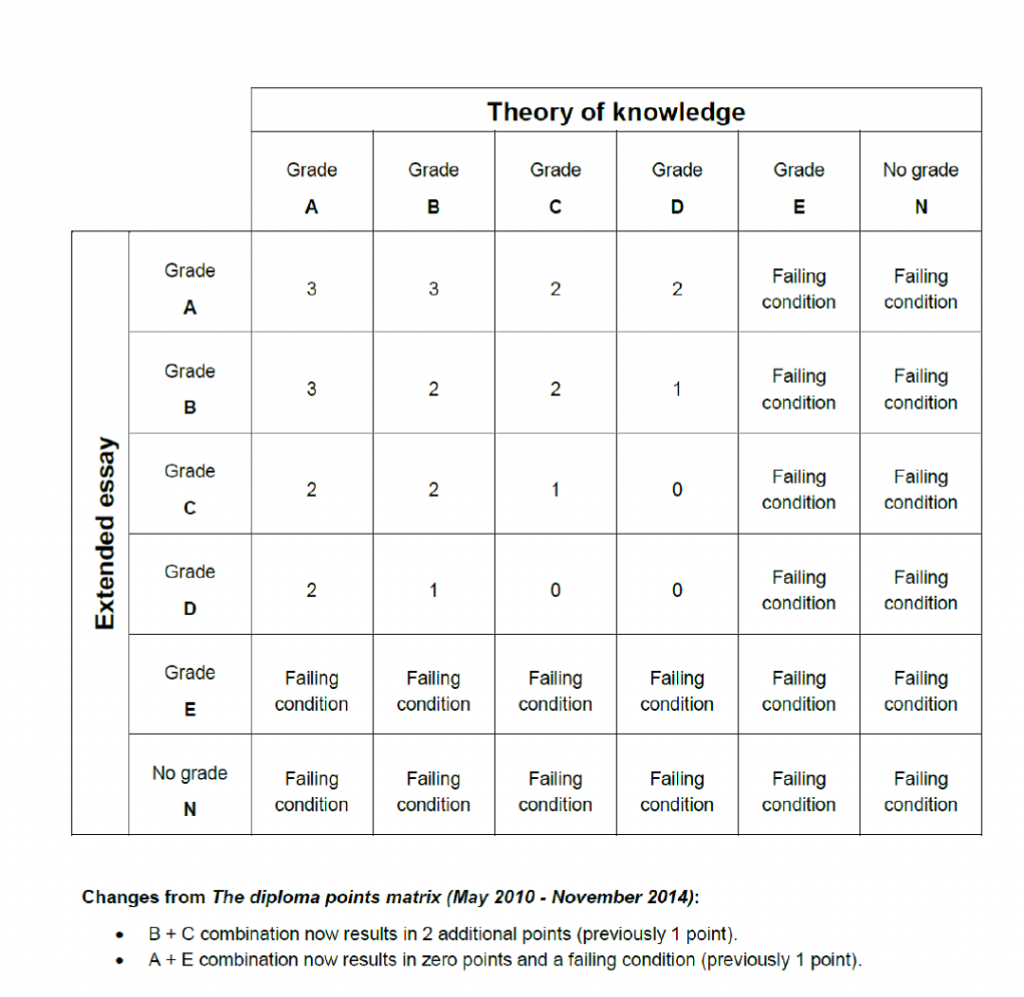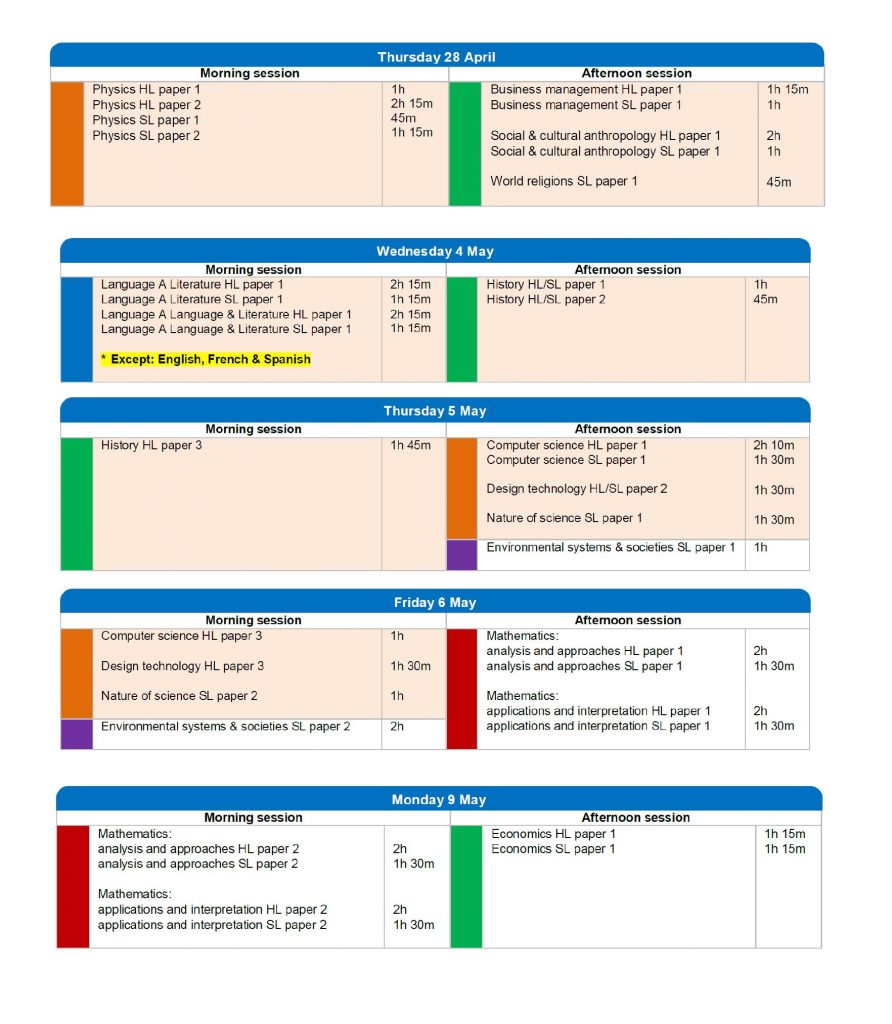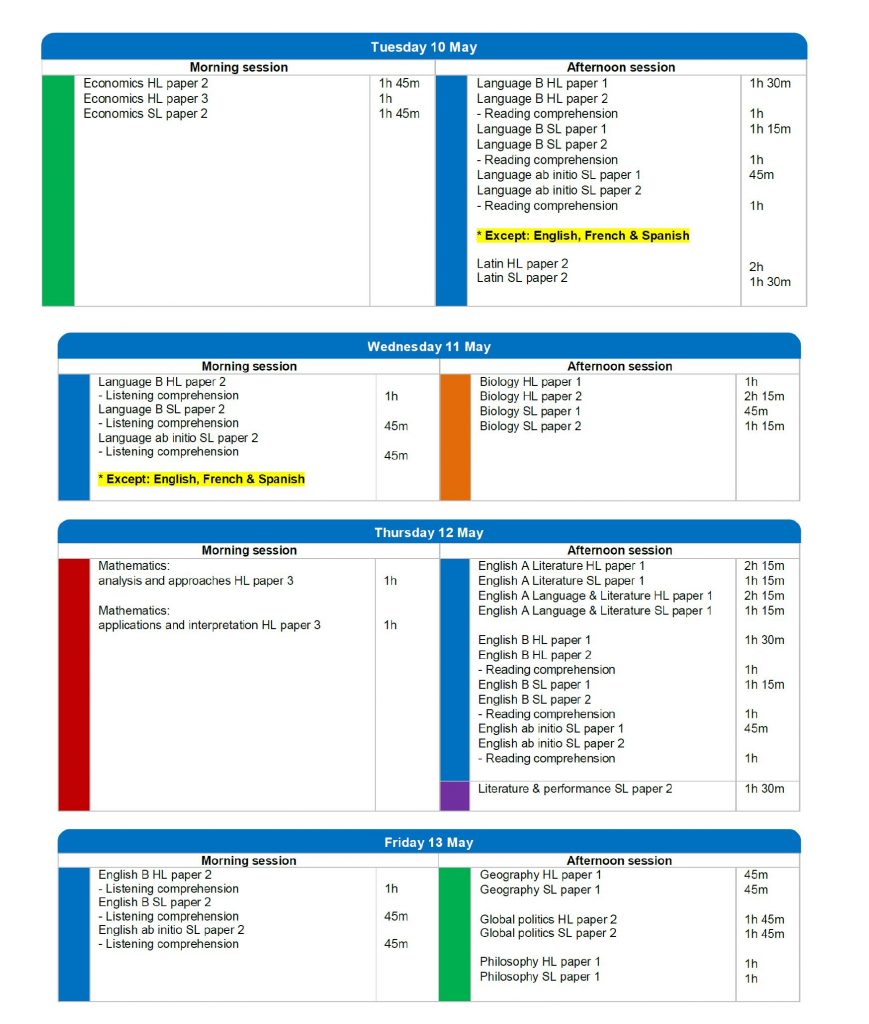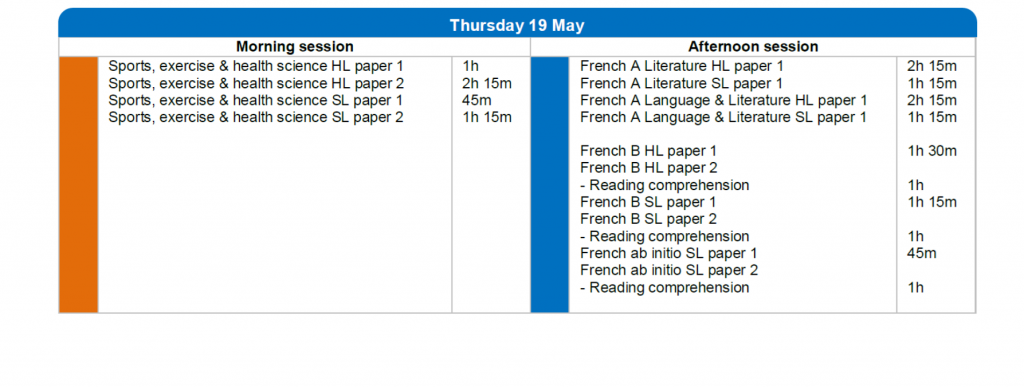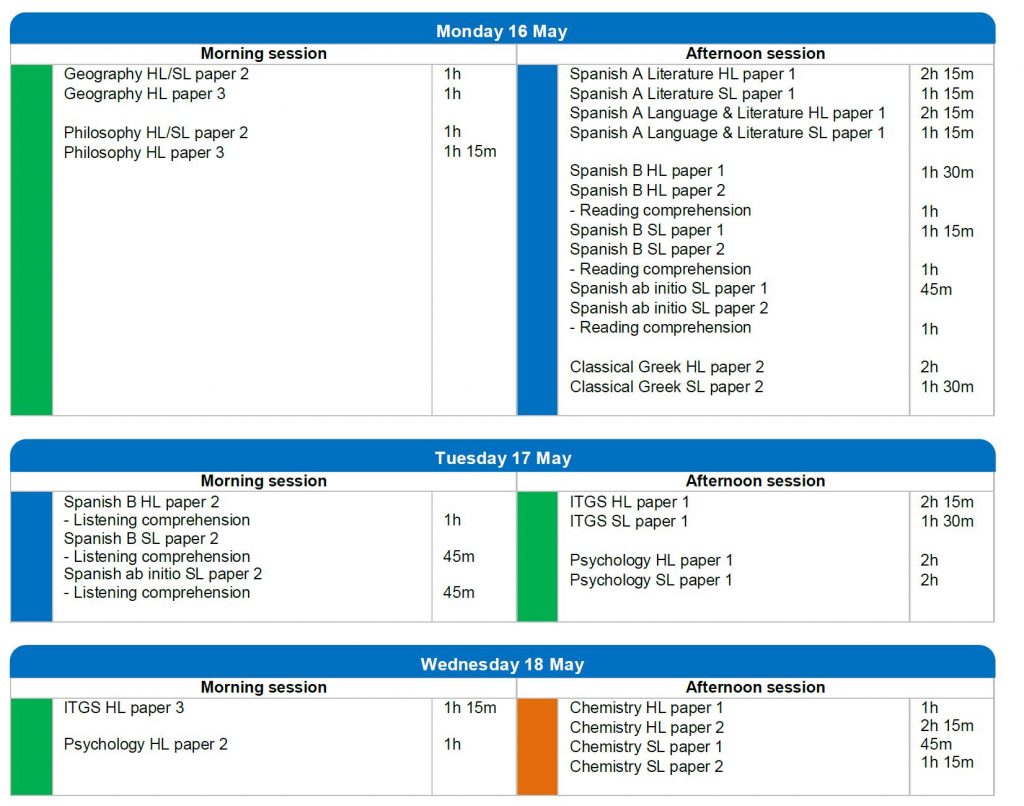“IB really has helped me in my university life and as an aspiring solicitor. The international and collaborative approach of the IB is something I can talk about in interviews and application forms, and my CV and LinkedIn are ever more impressive with voluntary work due to CAS. The IB is full of subjects and projects that develop transferable skills, and those transferable skills will help IB students in the future, no matter what they wish to do after graduation.”
Jemina Kauppinen, Class Of 2018
Dear Student!
The Diploma Programme of the International Baccalaureate is designed to offer a modern adolescent exceptional academic skills and qualifications in a fast-paced global environment. It is a journey meant for a forward-thinking, motivated and open-minded young individual.
“IB may sound like a daunting experience but you learn critical and independent thinking throughout the whole process. It requires that you develop a strong work ethic and learn to manage your time effectively. Through all this you come out a more developed and mature person.
Both of us are very happy to graduate and we’re looking forward to the different experiences, University for example, which the IB has allowed us to head towards. We believe that it has prepared us for studying in University due to the nature of the IB Programme.
All in all, IB was a positive experience and to the people who want to follow through with further studies and open up more opportunities for themselves, we highly recommend the IB Programme and all it has to offer.”
Julia Vallius and Sami Paunonen, Class of 2016
What is the IB Diploma Programme?
The International Baccalaureate is a non-profit foundation that offers internationally recognized and highly valued study programmes, which equip the student with extensive skills and better-than-average qualifications for admission to both domestic and foreign universities. Currently 153 countries all over the world have IB-schools teaching the Diploma Programme..
IB-studies differ remarkably from the national upper secondary schooling. The IB curriculum serves as a framework in all the IB schools the world over. The IB-equivalent of the Finnish upper secondary studies is called the Diploma Programme. A DP-student studies fewer subjects than an upper secondary student but there is more substance and scope to each subject with the focus on critical, innovative and scientific analysis rather than learning by heart. For instance in sciences, laboratory work accounts for at least 25 % of the course work whereas in languages the emphasis is on literature. All the teaching in the IB Diploma Programme is done in English, except for the first language studies (Literature) where the language of instruction is always the mother tongue.
A Diploma Programme student must choose six subjects, three of which are studied in higher level (HL) and the other three in standard level (SL). The subjects are picked from six subject groups (see below), basically one from each. Three choices are compulsory: First language from group 1, another language from group 1 or 2 and Mathematics from Group 5.
A 7th subject is possible but then the student must choose the six ones that contribute to the diploma.
In addition, every student takes a Theory of Knowledge-course (TOK), participates in Creativity, Action and Service-program (CAS) and writes an Extended Essay, which is comparable to a master’s thesis in universities. IB-students do not take the national matriculation exam. Instead, they take the written final examination at the end of their IB studies in the 2nd spring term. The final examination session is preceded by the mock-exam period that simulates the Final session. Mocks typically take place in early March. The idea of the mock-exams is to accustom students to pacing and time management of the written Diploma Programme examinations.
Generally, the IB-studies last for two years (IB1, IB2) starting with a preparatory year when the IB-students study subjects from the national curriculum with the teaching primarily done in English followed by the two academic years. The aim of the pre-year is to integrate the students into upper secondary studying in general and also introduce them to the IB studying methods. The pre-year is in use in all the Finnish IB-schools.
Available Diploma Programme subjects at Kannas:
Group 1 : Finnish literature HL/SL, English Lang. and Lit. HL/SL, self-taught language (only SL)
Group 2: English B HL/SL, Spanish ab initio only SL
Group 3: History HL/SL, Economics HL/SL, Environmental Systems and Societes (ESS) only SL
Group 4: Biology HL/SL, Chemistry HL/SL, Physics HL/SL , ESS only SL
Group 5: Mathematics: applications and interpretation or analysis and approaches HL/SL
Group 6: Visual Arts only SL (or another subject from group 3 or 4)
Self-taught programme for foreign students
Because every IB-student has to study their mother tongue and Kannas school can only offer Finnish Literature A and English A language and literature, some foreign students enter the so-called self-taught language programme where they study their first language as distant learners. This is because Kannas school cannot provide teaching in this foreign language. The student must appoint a supervisor, either in Finland or abroad, who then marks for example the written assignments. The school assists, to its best ability, the student in the appointment of the supervisor. The Finnish literature A teacher at Kannas acts as a school-based contact person between the student and the supervisor.
The Finnish teacher meets with the student on a regular basis for consistent progress of the self-taught studies.
The student is responsible for covering any costs caused by the use of an external supervisor.
There can be a maximum of 5 self-taught students in any language in any cohort.
Academic honesty
We are all living in a world where informtion is readily available from virtually an infinite amount of sources. The digitalized flow of data alone sets challenges to students in terms of acknowledging the sources that have been used. In brief, when gathering outside information for an assignment or any school work, the source of this information must be mentioned. This is called academic honesty and it is commonly perceived as a set of values and skills that promote personal integrity and good practice in teaching, learning and assessment. According to the IB, there are two types of violation of academic honesty: academic infringement and malpractice.
Academic infringement basically makes up unintentional cases where a student has for example improperly marked the source material or used deficient referencing. If the final award committee decides that an academic infringement has been established, no marks will be awarded for the component or part(s) of the component. The candidate will still be eligible for a grade in the subject or IB diploma requirement concerned.
Malpractice means behaviour that aims at gaining an unfair advantage in school work or in any assessed component. The following are among the most typical types of malpractise:
- plagiarism: claiming any copied material as one’s own
- collusion: conspiring or plotting among or between students to cover malpractice such as copying
- duplication: presentation of identical material for different assessment components
- other violation of good practice, such as having unauthorised material in the examination session, cheating during an exam etc.
We at Kannas school have always committed ourselves to uncompromised maintenance of academic honesty by utilizing all the available resources and technology. Any violation of academic honesty, or a confirmed attempt, is subject to penalties. If doubts of such conduct arise or actual evidence is produced, the student in question is summoned for a meeting conducted by the principal in the subject teacher’s presence. Based on the student’s response the evidence produced by the subject teacher, the principal and the subject teacher rule whether reasonable doubt remains. If the malpractise is confirmed, the student is issued either an oral or written warning depending on the gravity of the violation. In each case, at least the assessed component is failed. Pre-meditated malpractise results in a written warning and failing the entire course. Also, the parents are notified on any type of violation of good academic practise.
Internal and external sanctioning in the Diploma Programme assessment
If suspicion arises that a DP candidate might have resorted to violation of good practice, the candidate is first notified and he or she has a right to submit a response. After hearing the subject teacher and scrutinizing the response, the DP coordinator and the principal rule whether the allegation is still founded based on the subject teacher’s report and the student’s response. The infringement can be dealt with internally if it is detected at an early stage and the student is cooperative. The component will then not be assessed or graded but, depending on the quality of the infringement, the student is required to produce complementary material for the assessment or do the work all over again. Such sanctions are applied to first time offenders when an infringement in homework or any internal examination not leading to final grading is in question.
Should the student repeat the violation, there will be no grade for the component. Multiple violations of academic honesty automatically lead to disqualification from the course and the IBCA is also notified on the proceedings. In such cases it may be recommendable that the student be not allowed to continue in the Diploma Programme. The students’ parents are notified in each case.
If the teacher finds any reason to doubt the integrity of a test component that is to lead to a final grade, such as the final exam or the Extended Essay, stricter measures are applied. If there is enough time until the submission of the component for external assessment, or it is first draft of the EE that does not meet the requirements, the above mentioned in-school measures may be taken and the student has a chance of being awarded a grade for his or her work, provided that the student fully complies with the school’s regulations. However, if the deadline for submission is too close, the student is awarded an F for the subject. Such an outcome also means there will be no receiving the Diploma either.
In a case where the component has already been sent out for external assessment and malpractice is detected at such a late stage, the IBCA is informed on the matter. An investigation conducted by IBCA is launched when it receives a clarification from the DP coordinator on the alleged malpractice or if it is the examiner or anyone from the IB staff finding signs of compromised integrity in the submitted work. Evidence must be produced by the IB staff to support such suspicions. In the same token, the DP coordinator is informed on the suspicions and the investigation. The coordinator, in turn, informs the headmaster and the suspected candidate’s parents. The candidate is summoned for a meeting with the respective subject teacher and the headmaster present. After receiving the candidate’s written response, the coordinator then submits the response, the subject teacher’s summary and the coordinator’s own summary of both the alleged malpractice and the interview session to the IBCA for ruling. The summary is also submitted to the candidate’s parents.
The candidate is kept informed on the proceedings at all times. If the final ward committee confirms the alleged malpractice, no marks will be awarded for the component or the student is failed in the subject, depending on the severity of the violation. If there is proof of for example a falsified CAS record, the consequences, again, depend on the extent of the malpractice. At least the record has to be completed to the examiners’ satisfaction in due time. In a serious case the candidate can be denied registration for examination or the awarding of the Diploma may even be annulled.
Kannas school will see to that the candidates’ parents are informed on the consequences of academic dishonesty and the Swiss law by which serious cases of violation are ruled. When entering the first DP year each student is required to sign a commitment to the maintenance of good academic practise.
The link here contains essential information on assessment requirements and further updates on sanctions for plagiarism, for example.
IB Coordinator and Guidance Counsellor
IB coordinator sees to that the Diploma Programme programme is duly completed in accordance with the IB regulations. The IB coordinator also registers the students for the final exams and oversees as well as coordinates the arrangements of the Final Exams so that the facilities and procedures are in keeping with the IB requirements. In general,the IB coordinator is a liaison between the school and the IB organisation.
A student wishing to change subjects must approach the IB coordinator for such purposes. Such a change must be made by the end of the autumn term of the IB1 year. It’s always necessary to schedule an appointment in such cases either through an email or on the mobile. Unless in class, the IB coordinator is accessible at all times, either in the office on the 2nd floor or through mobile devices.
The guidance counsellor’s responsibility is to advise and oversee the students’ national level subject choices and progress in general. The guidance councellor’s role is significant for the new IB Pre-Year students since they first pick subjects from the national selection. The Guidance Councellor introduces the IB students to chances and alternatives of further studies in higher education. If you wish to talk to the guidance counsellor a scheduled appointment is always recommendable. For quick questions, however, you do not need to reserve an appointment. Discussions with the guidance counsellor are confidential. Parents or guardians may also contact the guidance counsellor if they wish to discuss a student’s future studies.
Internal and external assessment
The grading system in the Diploma Programme differs remarkably from the Finnish numeric grades. In general, any assessed component, i.e. an assignment or test during the 2 academic years, is graded on a scale of 1 – 7. The subject grade is typically made up of both internal assessment, i.e. the work done and assessed within the school and some of it moderated by external IB examiners and external assessment, such as the written assignments in languages, the extended essay and the final exams. These pieces of work are assessed solely by external examiners. Based on all such student performance, a grade from 1 to 7 is available in each subject. All six diploma subject grades can amount to a maximum of 45 points, which also includes the 3 bonus points from Theory of Knowledge and the Extended Essay combined. The required minimum for the awarding of the Diploma is 24 points. Students also have to complete the CAS (Creativity, Action and Service) Programme.
Deadlines
Students see the deadlines in the IA – calendar for First drafts and Final Drafts in different subjects. Failing to meet these deadlines results in the following sanctions:
- If the student misses the First Draft -deadline, the teacher does not comment on it anymore for upgrades.
- Missing the Final Draft deadline causes the Draft Version to be submitted to the IB.
- If the student has not delivered the Draft Version at all by the Final Version deadline, no version is submitted, which leads to no diploma.
Absences
To be eligible for assessment, a Diploma Programme student is obliged to attend classes. In case of absences, documentary explanation must be produced.
Exam retakes
If a student is absent from an IB exam, it can be retaken if sufficient documentation on the reason for the absence, such as a doctor’s report, is produced. IB Students register for the school’s retake session normally with other students. Registration deadlines are non-negotiable.
Mock exams
The Mocks give the students an idea of the structure and practices of the Final exams. The 2nd year IB-students typically take the mocks after the winter break in early March.
Criteria for awarding the diploma
From the May 2015 session the following failing conditions and associated codes will replace those in current use.
1. CAS requirements have not been met.
2. Candidate’s total points are fewer than 24.
3. An N has been given for theory of knowledge, extended essay or for a contributing subject. See the matrix below.
4. A grade E has been awarded for one or both of theory of knowledge and the extended essay.
5. There is a grade 1 awarded in a subject/level.
6. Grade 2 has been awarded three or more times (HL or SL).
7. Grade 3 or below has been awarded four or more times (HL or SL).
8. Candidate has gained fewer than 12 points on HL subjects (for candidates who register for four HL subjects, the three highest grades count.)
9. Candidate has gained fewer than 9 points on SL subjects (candidates who register for two SL subjects must gain at least 5 points at SL).
Excellent performance in the 6 subject areas results in a grade 7 for each, or a total of 42 points. The maximum diploma point score is 45. Theory of Knowledge and the extended essay contribute to the overall score through a matrix system, which awards up to 3 additional points based on the candidate’s combined performance.
The graduation ceremony of K19IB -group
The graduation ceremony will be arranged in Terijoki-hall is typically arranged on the last Friday of August. More info will follow shortly.
IB-Fees and deadlines for retake exam registration
Even though studying in the Diploma Programme is free of charge, there is a subject fee when a student participates in the Final Examination session.
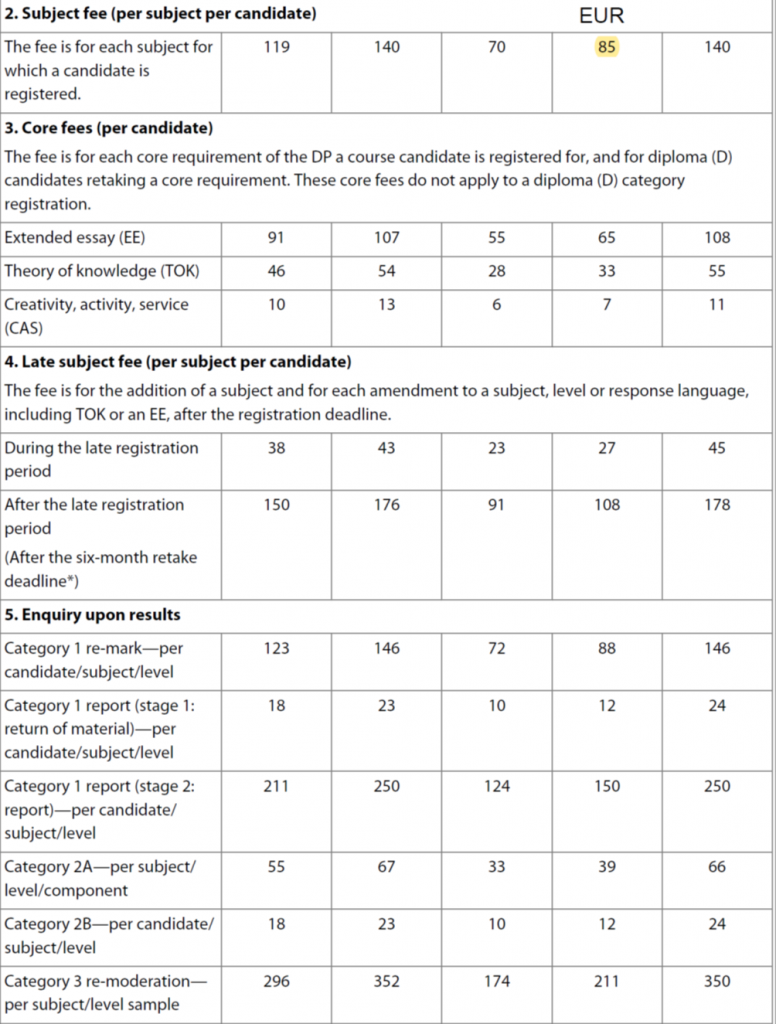 The invoices will typically be sent out to parents in November of the second academic year. The deadline for retake registration is 20. July and for re-marks 29. August.
The invoices will typically be sent out to parents in November of the second academic year. The deadline for retake registration is 20. July and for re-marks 29. August.
The Extended Essay
The extended essay is an in-depth study of a focused topic chosen from one of the subjects studied for the IB diploma. It is intended to promote coherent research and writing skills, intellectual discovery and creativity. It provides students with an opportunity to engage in personal research on a topic of their own choice. Students are first introduced to the requirements of academic writing and then guided to pick a subject for the EE, which typically happens in the first IB year. The work is supervised by an IB teacher of the chosen EE subject. The EE is assessed by an external examiner. This leads to a major piece of formally presented, structured writing, in which ideas and findings are communicated in a reasoned and coherent manner, appropriate to the subject chosen.
The EE-Study Guide can be found here.
Essay scheduling, IMPORTANT!
The EE work starts, under the guidance of the supervisor, with the selection of the essay topic followed by the Research Question. This question must be decided on by 30. April of the IB1 -year. The supervisor oversees the writing process with a Progress Form for which the student provides the necessary essay info. The student will not be transferred to IB2-year if this info is not submitted to the supervisor. At this point, the EE-subject cannot be changed anymore. The first Draft Version must be submitted to the supervisor by 30. October of IB2-year. The IB coordinator registers the student for the Final Exams only if the Draft has been submitted by the deadline. The Final Draft must be submitted to the supervisor and coordinator by the first school day after the Christmas break.
The extended essay is assessed against common criteria, interpreted in ways appropriate to each subject.
The extended essay is:
- compulsory for all Diploma Programme students
- externally assessed and, in combination with the grade for theory of knowledge, contributes up to three points to the total score for the IB diploma
- a piece of independent research/investigation on a topic chosen by the student in cooperation with a supervisor in the school
- chosen from the list of approved Diploma Programme subjects
- presented as a formal piece of scholarship containing no more than 4,000 words
- the result of approximately 40 hours of work by the student
- concluded with a short interview, or viva voce, with the supervising teacher (recommended).
Theory of Knowledge
Theory of Knowledge is considered the philosophical, and ideological, core of the Diploma Programme. It’s catchphrase is “How do we know what we claim to know?” Theory of Knowledge studies account for roughly 3.6 courses in length spanning throughout the two IB years. The purpose of the interdisciplinary (covering all the subjects) TOK course is to accustom the students to digging deeper into what knowledge actually is and how culturally bound it is, which, in turn, is meant to enhance cultural understanding. Students write a TOK essay, 1600 words max and it is externally assessed. An oral presntation also belongs to the course.
Creativity, Activity, Service
CAS is an is an essential part of the IB Diploma programme and it is completed outside classes. The CAS Programme lasts throughout the two acadmic years. Participation in CAS enables students to draw on for example their artistic or sports interests and engage in community service, thus providing a meaningful change from the school routines. It also improves the students’ interactive skills when they take other people’s needs into consideration. All the three CAS areas (Creativity, Activity and Service) must be featured in a student’s CAS Project.
TOK and the extended essay
The performance of a student in both Diploma Programme requirements, theory of knowledge and the extended essay, is determined according to the quality of the work, based on the application of the IB Diploma Programme assessment criteria. It is described by one of the band descriptors A–E. Using the two performance levels and the diploma points matrix, a maximum of three diploma points can be awarded for a student’s combined performance. The bonus points for CAS and TOK as well as the failing conditions can be seen in the matrix below.
May 2022 Final Examination Schedule



